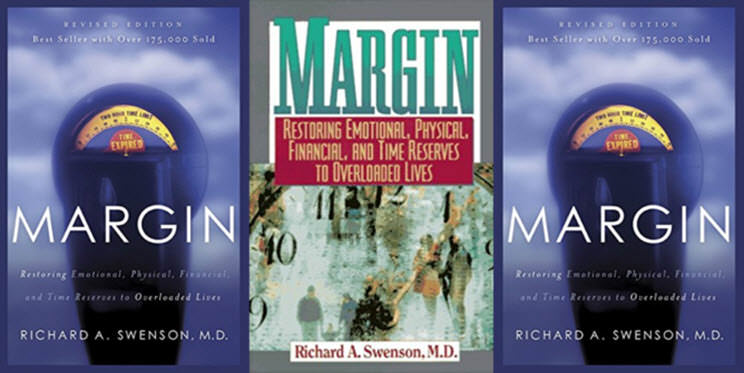Several years ago, I served a client who appeared to be carrying the world’s weight on his shoulders. This CEO was running a business passed down from his father. While the company was stable, his personal life was not. I was more than his CFO on a part-time basis. I felt like his priest.
A U.S. bank survey reveals my former client is not alone. Although 88% of small business owners feel fulfilled by their work, 83% feel stressed by their workload and not having enough time, and 1 in 2 small business owners have lost touch with close friends/family (52%) or have been a worse romantic partner (51%).
The survey also revealed that small business owners routinely gave up 1) personal time, 2) staying fit, 3) maintaining healthy relationships, and 4) other personal priorities.
While these business owners may have plenty of net operating margin in their businesses, their personal margin is virtually bankrupt.
The Book for Overburdened CEOs

MARGIN by Dr. Richard Swenson is the best non-business book ever written that every overburdened, overworked, and stressed executive should read.
Dr. Swenson calls MARGIN the opposite of overload. My favorite description of MARGIN is the formula he offers below:
Power – Load = Margin
He defines power as factors like skills, time, emotional strength, physical strength, spiritual vitality, finances, social support, and education.
Load includes internal and external factors (personal expectations, emotional disabilities, work, relational problems, responsibilities, financial obligations, and civic involvement).
According to Dr. Swenson, when the load exceeds power, we experience a negative margin or are overloaded. Over the long haul, we hit burnout if we stay in negative margin status. Want to increase your margin? Simple. Increase power, reduce load, or do both.
Given that the formula is simple and the consequences of living without margin are painful, why is the concept not universally understood? The answer reveals a principle: not all societal pathogens are equally opaque. Or, in other words, the cause of some pains are more readily apparent than others.
Dr. Richard Swenson
An Example of No Margin
Ray Dalio is the author of Principles: Life and Work. He founded the hedge fund Bridgewater Associates, one of the largest in the world.
Dalio claims self-awareness is his best trait. In chapter 5, he’s open about his personal challenges:
- “In 2008, I was working about eighty hours a week doing my two full-time jobs (overseeing our investments and overseeing the company), and in my opinion, not doing well enough at either.”
- “But now that we were a bigger company, the business management side was demanding much more than I had to give it.”
- “I clearly hadn’t done a good enough job finding and training others to whom I could delegate my responsibilities.”
- “I had not achieved this highest level of success. In fact, I was still struggling to achieve the second-highest level (doing things well myself), even though Bridgewater was extremely successful.”
I appreciate Dalio’s candor and honesty. During this period, he was experiencing overload as opposed to margin.
What would you have done if Dalio had been one of your team members? Accordingly, what are you doing now if you lack margin right now?
Read the Book
This book has been a source of wisdom and strength over the past two decades. When I’m in overload status, I now know the solutions to the problems that got me there.
While the book has many statistics, charts, and supporting research, the book is still easy to digest. Buy a few copies–keep one for yourself and save the others for staff members needing the encouragement to reduce their loads.







